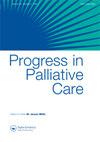Maintaining control: A qualitative study of being a patient in need of specialized palliative care during the COVID-19 pandemic
IF 0.8
Q4 PUBLIC, ENVIRONMENTAL & OCCUPATIONAL HEALTH
引用次数: 4
Abstract
Abstract Being a patient in need of specialized palliative during the COVID-19 pandemic is challenging. Governments around the world have reduced the available health care services as well as restricted in-person meetings between patients, health care professionals, and relatives. The aim of this study was to explore the experiences of patients with specialized palliative care needs during the period of restrictions requiring social distancing due to the COVID-19 pandemic. The analysis of this qualitative study was guided by a grounded theory approach. The participants were patients living in their own homes who were being treated by the outpatient clinic palliative care unit at the Herlev and Gentofte University Hospital in Denmark. Participants’ main concern was maintaining control during the pandemic. They achieved this by aiming to secure a meaningful life by remaining occupied during the day, balancing social contact, contemplating the reopening of society, and seeking help from health care professionals. Participants were concerned about losing control and this concern increased with the reopening of society. Health care professionals must ensure that they provide support and care for patients with specialized palliative care needs when societal restrictions change.维持控制:新冠肺炎大流行期间需要专业姑息治疗的患者的定性研究
摘要在新冠肺炎大流行期间,作为一名需要专业姑息治疗的患者是具有挑战性的。世界各国政府减少了可用的医疗保健服务,并限制了患者、医疗保健专业人员和亲属之间的面对面交流。本研究的目的是探索在新冠肺炎大流行导致需要保持社交距离的限制期间,有特殊姑息治疗需求的患者的经历。这项定性研究的分析是以一种有根据的理论方法为指导的。参与者是住在自己家里的患者,他们正在丹麦赫列夫和根托夫特大学医院的门诊姑息治疗室接受治疗。参与者主要关心的是在疫情期间保持控制。他们通过在白天保持忙碌、平衡社交、考虑重新开放社会以及寻求医疗保健专业人员的帮助来确保有意义的生活,从而实现了这一目标。与会者担心失去控制,这种担忧随着社会的重新开放而加剧。当社会限制发生变化时,卫生保健专业人员必须确保为有特殊姑息治疗需求的患者提供支持和护理。
本文章由计算机程序翻译,如有差异,请以英文原文为准。
求助全文
约1分钟内获得全文
求助全文
来源期刊

PROGRESS IN PALLIATIVE CARE
PUBLIC, ENVIRONMENTAL & OCCUPATIONAL HEALTH-
CiteScore
2.60
自引率
11.80%
发文量
24
期刊介绍:
Progress in Palliative Care is a peer reviewed, multidisciplinary journal with an international perspective. It provides a central point of reference for all members of the palliative care community: medical consultants, nurses, hospital support teams, home care teams, hospice directors and administrators, pain centre staff, social workers, chaplains, counsellors, information staff, paramedical staff and self-help groups. The emphasis of the journal is on the rapid exchange of information amongst those working in palliative care. Progress in Palliative Care embraces all aspects of the management of the problems of end-stage disease.
 求助内容:
求助内容: 应助结果提醒方式:
应助结果提醒方式:


